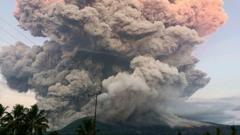In the wake of renewed conflict, residents are left questioning their safety and the intentions of world leaders.
**Escalating Tensions: Tehran Residents Face Uncertainty Amid Israeli Strikes**

**Escalating Tensions: Tehran Residents Face Uncertainty Amid Israeli Strikes**
As airstrikes persist, the people of Tehran are grappling with fear and uncertainty over their future.
The distant sounds of sirens and explosions resonate in Tehran, where anxiety grips the city as Israeli jets continue to strike. My sister, trapped in her high-rise apartment, expresses her fears over our shaky WhatsApp connection. "What are we supposed to do?" she pleads, echoing the sentiments of many. The words of US President Trump are ringing in her ears: he has advised Tehran's residents to evacuate. "Is he for real?" she wonders, questioning the validity of his alarming remarks.
Since Thursday night, a wave of airstrikes has transformed the skies of Tehran into a scene of chaos. Despite active anti-aircraft defenses, the Israeli military remains unchallenged, causing widespread panic among civilians. My sister's vantage point offers a disconcerting view of the ongoing attacks, intensifying the tension in her voice as she sits trapped within her apartment walls.
While locals watch shops shutter and families evacuate, she remains stubbornly in place, believing her neighborhood lacks critical military targets. Yet uncertainty looms as the area houses commercial units tied to the Revolutionary Guards, a fact she only half understands. Much of their operations occur in secrecy, leaving residents unaware of possible threats in their midst.
As Tehran’s heart quiets, food supplies dwindle in the wake of closure announcements from bakeries and markets. Yet as the residents weigh their options, her choice to stay—born from a lack of alternatives—is paralleled by those bravely navigating the tumultuous streets. What was once a bustling metropolis is now an eerie tableau, where fear reduces interactions to a mere whisper.
The few who remain grapple with more than just imminent dangers. The looming specter of radioactive fallout from Iran's nuclear sites, repeatedly targeted by Israeli assaults, adds layers of dread to their plight. The International Atomic Energy Agency efforts to reassure locals about unchanged radioactivity levels do little to quell rising anxieties.
In these trying times, many turn to Persian-language broadcast networks from outside the country for accurate information. BBC Persian’s web traffic has surged as citizens seek clarity amidst chaos, marking a pivotal shift in media consumption during crises. As Trump urges Iran towards surrender, the indomitable spirit of Supreme Leader Ayatollah Ali Khamenei counters with declarations of resilience, warning that surrender is not an option.
With no clear end to the conflict in sight, the echoes of uncertainty continue to resonate throughout the streets of Tehran, leaving the populace in a state of veiled apprehension, pondering the ramifications of potential chaos and instability.
Since Thursday night, a wave of airstrikes has transformed the skies of Tehran into a scene of chaos. Despite active anti-aircraft defenses, the Israeli military remains unchallenged, causing widespread panic among civilians. My sister's vantage point offers a disconcerting view of the ongoing attacks, intensifying the tension in her voice as she sits trapped within her apartment walls.
While locals watch shops shutter and families evacuate, she remains stubbornly in place, believing her neighborhood lacks critical military targets. Yet uncertainty looms as the area houses commercial units tied to the Revolutionary Guards, a fact she only half understands. Much of their operations occur in secrecy, leaving residents unaware of possible threats in their midst.
As Tehran’s heart quiets, food supplies dwindle in the wake of closure announcements from bakeries and markets. Yet as the residents weigh their options, her choice to stay—born from a lack of alternatives—is paralleled by those bravely navigating the tumultuous streets. What was once a bustling metropolis is now an eerie tableau, where fear reduces interactions to a mere whisper.
The few who remain grapple with more than just imminent dangers. The looming specter of radioactive fallout from Iran's nuclear sites, repeatedly targeted by Israeli assaults, adds layers of dread to their plight. The International Atomic Energy Agency efforts to reassure locals about unchanged radioactivity levels do little to quell rising anxieties.
In these trying times, many turn to Persian-language broadcast networks from outside the country for accurate information. BBC Persian’s web traffic has surged as citizens seek clarity amidst chaos, marking a pivotal shift in media consumption during crises. As Trump urges Iran towards surrender, the indomitable spirit of Supreme Leader Ayatollah Ali Khamenei counters with declarations of resilience, warning that surrender is not an option.
With no clear end to the conflict in sight, the echoes of uncertainty continue to resonate throughout the streets of Tehran, leaving the populace in a state of veiled apprehension, pondering the ramifications of potential chaos and instability.






















